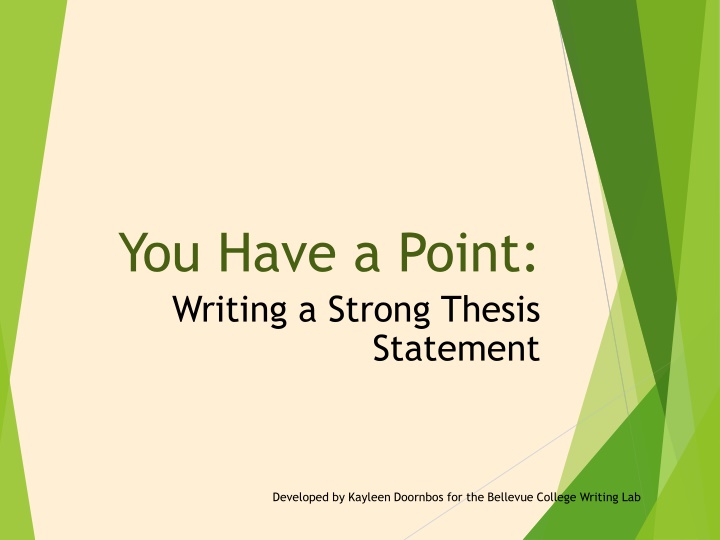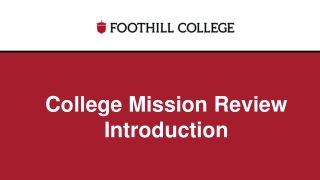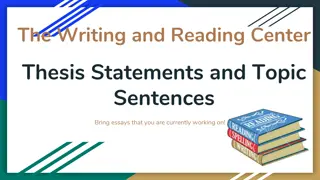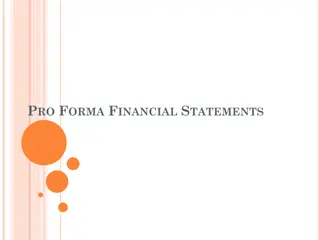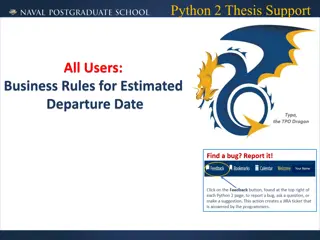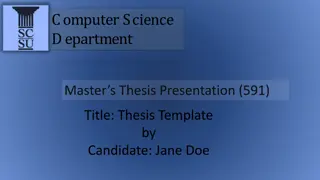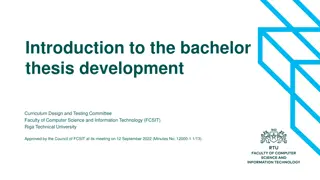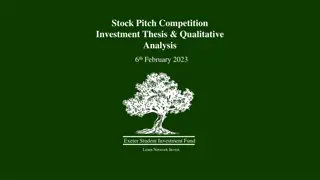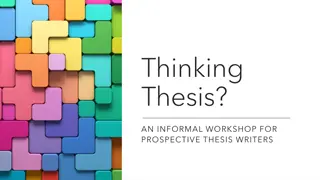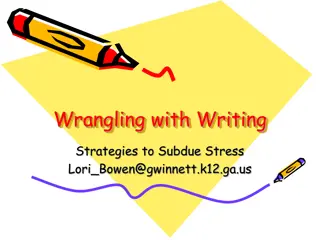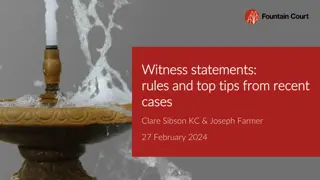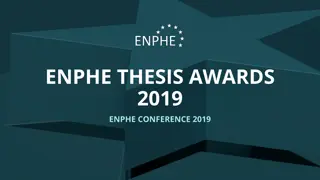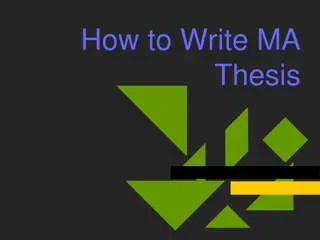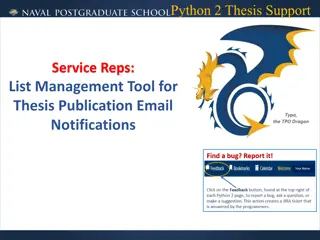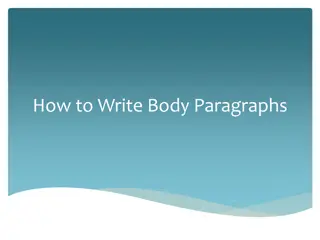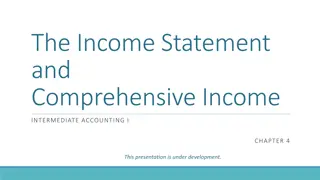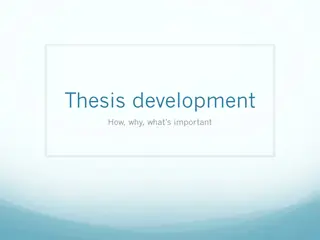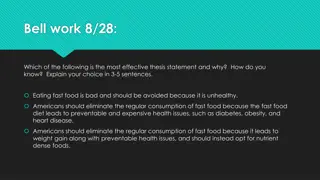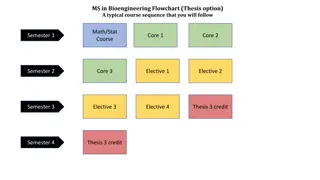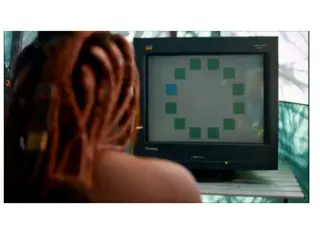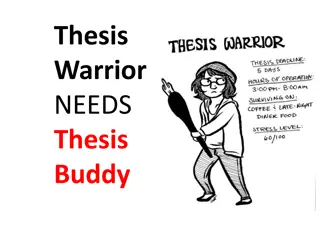Crafting Strong Thesis Statements
Understanding the essence of a thesis statement, its components, and the process of developing one; the importance of clarity, specificity, and purpose in forming a thesis statement; examples and guidelines presented for effective thesis writing.
Download Presentation

Please find below an Image/Link to download the presentation.
The content on the website is provided AS IS for your information and personal use only. It may not be sold, licensed, or shared on other websites without obtaining consent from the author.If you encounter any issues during the download, it is possible that the publisher has removed the file from their server.
You are allowed to download the files provided on this website for personal or commercial use, subject to the condition that they are used lawfully. All files are the property of their respective owners.
The content on the website is provided AS IS for your information and personal use only. It may not be sold, licensed, or shared on other websites without obtaining consent from the author.
E N D
Presentation Transcript
You Have a Point: Writing a Strong Thesis Statement Developed by Kayleen Doornbos for the Bellevue College Writing Lab
For Today A thesis statement: what it is & is not, and what it does Origin story: where thesis statements come from Proving ground: draft and test some thesis statements
A thesis is just an idea A thesis is the controlling idea, the main point, in other words, the conclusion you have drawn about the evidence you have accumulated (Fowler, Aaron, and Okoomian 30).
A thesis statement expresses the idea Names the topic clearly Asserts something specific and significant in the form of a statement, not a question Conveys your reason for writing Usually shows the order of ideas in the essay
A Thesis Comes From a Process 1. Gather information 2. Make decisions about it 3. Examine your reasons for your decisions 4. Try out a draft 5. Test it 6. Revise the sentence 7. Test the revision 8. Repeat steps 6 & 7 as necessary
1. Gather information assignment prompt lived experiences fiction essays journal articles books television, films, even advertising
Why are you writing? What is your purpose? Analysis? Argument? Exposition (explaining)? Comparison/Contrasting? Cause-and-Effect? Persuasion? The purpose of the essay is going to directly affect the content and form of the thesis statement.
Argument = stating your case The argumentative essay is the most common type: Make decisions draw a conclusion about the information you have gathered, and state the reasons why you have arrived at your conclusion.
Example of drawing a conclusion Example of drawing a conclusion for an argument thesis for an argument thesis Students are under a lot of stress from classes, homework, job, & family. They often have to commute great distances to attend BC. Their classes can be several hours apart in one day.
Studies have shown that a short nap can maintain and improve performance (Milner and Cote, 2009, et al.) Stress and sleep debt can lead to deadly metabolic diseases, depression, and heart disease. Conclusion: Bellevue College should invest in secure sleep pods for commuter students because doing so would support student success and reduce the risk of deadly illnesses.
Assert/Claim/Argument An assertion is a statement that has to be supported by evidence. It s also known as an argument, or as a claim and its rationale = a what and a why A thesis statement makes an assertion or an argument.
The what and the why The what: Bellevue College should invest in secure sleep pods for long-distance commuter students The why: to help support student success and reduce the risk of deadly illnesses.
A strong argument topic Concerns a conclusion drawn from evidence Can be debated reasonable people have different views of it. Is debated people, in fact, do take sides and argue over it.
A strong argument topic Is something you care about and know about or want to do research on. Is narrow enough to argue in the space and time available. (Fowler et al. 163)
Argument = a debatable point An opinion is a judgment based on evidence. It s an interpretation of information. Different people have different interpretations. When reasonable people differ on opinions, they often debate about them.
Argument = a debatable point A fact is not a good basis: no one can sensibly argue against it. Personal likes or beliefs also you like or believe something, end of story, no debate. If no one in their right mind would disagree about it, like getting a poke in the eye, it s not a good argument topic.
Did not! Did too! Counterarguments and Rebuttals Consider opposing views and address them in your intro, thesis statement, and essay. After discussing counterarguments, show why the opposing view(s) is/are mistaken in your rebuttal.
Evidence/Support/Rationale/Reasons . . . and it was a really good movie. What was good about it? I dunno, I just really liked it. What did you like about it? Um, well, there was a really cute guy in it, and he was forced to fight in a war I don t remember which one, but it was a really long time ago and he was taken prisoner. Eventually he gets home, and finds out his wife was told he was dead and married another guy, and just, well, it was really powerful for me because I actually know someone that something like that happened to. In other words, it was a powerful story of a soldier who loses his true love to war, and though it is a story seen many times throughout history, and thus trite or clich , it remains believable because it continues to happen in real life. Wait, have you seen it already?
Pre-emptively answer So what? Make a claim about something that matters to you and/or your readers --For example, argue the implications of the current trends in funding of post-secondary education. Show why you are making such a claim. --Don t be shy about your rationales or hold off until later to keep your reader curious you re writing an essay, not a suspense novel.
To get started, three questions: 1. What conclusion can I draw from the information I ve gathered so far? 2. How can I express that idea by naming the topic and making an assertion about it? 3. How can I convey my purpose in that assertion?
First-draft Thesis Statement This paper will compare and contrast the similarities and differences between the main characters in The Bean Trees. There are surprising similarities and differences between Taylor Greer and her boss, Mattie.
Test your thesis statement Does it draw a conclusion? Does it name the topic and make a significant assertion about it? Does it convey the purpose? Does it answer the question So what?
Thesis statement, draft two While both the protagonist, Taylor Greer, and her boss, Mattie, in The Bean Trees are strong female characters, Taylor s resolve to help two immigrants is not realistic.
Which is better for a 2 Which is better for a 2- - to 5 1) The Sex Pistols could not have succeeded without singer and lyricist Johnny Rotten, who provided the stage presence, poetry, and authentic working- class rage that galvanized the group's young English audiences. 2) The Sex Pistols were popular with young English audiences, and the singer and lyricist Johnny Rotten was very important to their success. to 5- -pg paper? pg paper? (from http://bcs.bedfordstmartins.com/writersref6e/Player/Pages/Main.aspx Exercise C2-1 Thesis statements, Question 3)
Revision practice Revision practice Because air pollution is of serious concern to people in the world today, many countries have implemented a variety of plans to begin solving the problem. Video games are not as mindless as most people think. Social workers in Metropolis leave much to be desired. (from http://bcs.bedfordstmartins.com/writersref6e/Player/Pages/Main.aspx Exercise C2-1 Thesis statements)
When to craft a thesis statement? Short on time? Hone your thesis statement carefully and then draft the paper. Have time for (or your assignment requires) an exploratory draft? Draft an essay that meanders and experiments with ideas to discover your thesis statement.
Thesis Sentence Structures Claim + reasons or Claim + reasons + examples Subordinate clause, main point in independent clause Counterargument + rebuttal as claim + reasons Claim + reasons + counterargument + rebuttal
Claim + reasons + examples Dancing with the Stars should be cancelled because it is repetitive, overwrought, and there is no longer an audience for it, as illustrated in recent negative reviews, lower numbers of voters, and reduced Nielsen ratings. Subordinate clause, main point in independent clause Although research has linked heart disease and diabetes to the typical diet in the United States, the American food industry has ignored medical evidence and continues to market unhealthy products to poorly educated consumers. Even though its detractors find it repetitive, overwrought, and its participants less than engaging, Dancing with the Stars continues to attract such a large audience that ABC should not cancel it.
Counterargument + rebuttal as claim + reason(s) While many find it repetitive, overwrought, and its participants less than engaging, the formulaic nature of Dancing with the Stars is accessible to millions, bridging cultural divides in America. Claim + reasons + counterargument + rebuttal Dancing with the Stars should be cancelled because it is repetitive, overwrought, and losing its audience, who, regardless of what the morning talk shows would have us believe, is not young and flourishing.
Build a thesis statement from a topic The Seahawks The Kardashians Climate change Is the Internet rotting our brains? 1. brainstorm an argument 2. reasons for your claim 3. consider possible counterarguments 4. your rebuttal to strengthen your own stance
Topic: leaf blowers 1. Brainstorm an argument I hate them because they re noisy, smelly, use fossil fuels and so probably produce CO2 and CO and methane, and they encourage laziness, so I think they should be banned or their use limited to certain types of locations or hours of the day or days of the week. Claim: Leaf blowers should be banned outright, or their use should be limited.
2. Reasons for your claim They disturb the peace and produce toxic emissions which are harmful to people s health and the environment. 3. Consider counterarguments Do all leaf blowers run on gasoline? How much do they save in time and money for labor compared to brooms and rakes? Is there a muffler that would prevent the shrill yet roaring noise? What hours or days of the week would be permissible? How would such a law be enforced?
4. Your rebuttal to strengthen your own stance If not all leaf blowers run on gasoline, then they should be banned in favor of electric ones. In large industrial or urban areas, the noise of leaf blowers is usually less noticeable, but in the suburbs and rural areas it is a nuisance, and ordinances could clearly identify leaf blowers as such. The emissions from gas-powered leaf blowers contribute to the distribution of particulates harmful to human respiratory systems and vegetation (Greely). Laws that prevent the sale of harmful goods could be used to prevent the sale of gas-powered leaf blowers.
Draft working thesis statement While leaf blowers may save time and money in labor costs, regardless of whether they are gas-powered or electric, we should use current city and county ordinances to ban leaf blowers outright because they there are no modifications to prevent them disturbing the peace and distributing toxins that are harmful to people s health and the environment.
Test your thesis statement Does it draw a conclusion? Does it name the topic and make a significant assertion about it? Does it convey the purpose? Does it answer the question So what?
Thesis Statement Recap The thesis statement is the central debatable point of an essay. It is developed by gathering information and drawing conclusions about it. It makes a specific, meaningful assertion that you and/or your readers care about. It will be influenced by the purpose of the essay.
The thesis statement contains ideas that are expanded upon in detail in the rest of the essay. It can be drafted first, or as a result of exploring ideas in a draft; it all depends on you and your situation. A thesis statement can take any of several forms, but it should always state a claim and the reasons for it.
Bibliography Bibliography Fowler, H. Ramsey, Jane E. Aaron, and Janice Okoomian, eds. The Little, Brown Handbook.Instructor s Annotated 8th ed. New York: Longman, 2001. Print. Channell, Carolyn E. and Timothy W. Crusius. Engaging Questions: A Guide to Writing. New York: McGraw-Hill, 2013. Print. The Thesis Statement: What It Is and How to Write One. Academic Success Center Writing Lab. Bellevue College, n.d. Web. 23 Jan. 2015.
